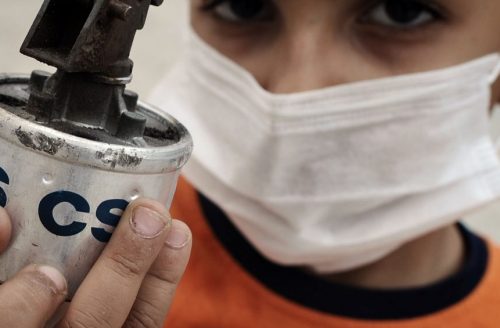For Immediate Release
The Bahrain government’s indiscriminate use of tear gas as a weapon has resulted in the maiming, blinding, and even killing of civilian protesters and must stop at once while the government reassesses its use, PHR declares in a report issued today.
“So-called tear gas, often considered a crowd-control method with no lasting harmful effects, can cause permanent injuries, miscarriages, and even fatalities as used by Bahrain’s security forces,” says PHR Deputy Director Richard Sollom, the report’s lead author. “Those tactics include firing tear gas canisters directly at civilians or into their cars, houses, or other closed spaces where toxic effects are greatly exacerbated.”
Sollom is in Washington, DC, to urge Congress to continue to ban the export of tear gas to Bahrain and to withhold military assistance to that country until it improves its record on human rights.
In testimony prepared for delivery today to the Tom Lantos Human Rights Commission, Sollom notes that in the course of three visits to Bahrain in the past 18 months to investigate human rights violations he had hoped to see such violations diminish, even as the regime grappled with continuing protests. “Instead,” he reports, “I find a government fixated on rhetoric rather than results.”
Sollom and co-author Holly Atkinson, MD, assistant professor of medicine at Mount Sinai School of Medicine and former president of PHR, interviewed more than 100 Bahraini citizens during their April investigation, including victims of civil rights violations, corroborating witnesses, civil society leaders, and government officials. Their 60-page report—Weaponizing Tear Gas: Bahrain’s Unprecedented Use of Toxic Chemical Agents Against Civilians—documents their findings, based on physical examinations and medical records. Among them:
- A teenage boy was struck in his left eye by a tear gas canister fired at close range, which fractured his eye socket and ruptured his eyeball, leaving him blind in that eye.
- A 27-year-old bystander suffered a fractured skull and intracranial bleeding when struck in the head with a tear gas canister.
- A physiotherapist started wheezing, felt short of breath, and had difficulty speaking for two weeks after exposure to tear gas.
- Several women who had miscarried reported that their doctors said they had noticed a significant rise in miscarriages in neighborhoods where tear gas was used frequently.
- An asthmatic man routinely exposed to tear gas died in the hospital of acute respiratory failure after exposure to yet another tear gas explosion.
PHR first documented the deleterious long-term health effects of tear gas 25 years ago, when South Korea’s use of the gas against civilian protesters caused toxic pulmonary damage and death. Though many long-term health consequences of such toxic chemical agents remain unknown, it is clear that the Bahraini security forces are wielding them as weapons not just to disperse crowds but to wound, harm, harass, and intimidate the largely Shi’a neighborhoods that are home to many protesters, in violation of UN protocols for the use of force. Similar tactics have been used in other countries recently, the report notes, including Egypt, Greece, Honduras, Israel, Libya, Turkey, and Uganda.
“This timely and incisive investigative report provides evidence that government forces, this time in Bahrain, have once again used the shield of a relatively innocuously named weapon to maim, sicken, and in some cases kill innocent civilians,” comments Howard Hu, MD MPH, who directs the Dalla Lana School of Health at the University of Toronto and is a medical expert on toxic chemical agents and a former board member of PHR. “The misuse of such weapons must be fully investigated and curbed if such oppressive practices and unnecessary suffering and deaths are to be avoided in the future.”
PHR has previously investigated and protested the militarization of Bahrain’s health-care system, including the arrest, torture, and imprisonment of medical workers who treated injured protesters, and the systematic interrogation of protesters who sought treatment at Salmaniya Hospital in Manama—all in violation of principles of medical neutrality.
Now, PHR is calling on Bahrain’s government to immediately end all attacks on civilians and to suspend its use of tear gas while it conducts an impartial investigation of tear gas misuse and holds accountable those who have used the gas in excessive or improper ways. In addition, PHR is asking that Bahrain’s government disclose information about the toxic chemical agents used by its security forces, and that it permit scientists and health professionals to study the effects of tear gas use in that country.
PHR is also seeking the creation of an international group of health professionals, public health experts, lawyers, and law enforcement officials to draft guiding principles on the use of all toxic chemical agents, and to determine whether certain such agents (including tear gas) now considered nonlethal should be reclassified under the Chemical Weapons Convention.
“It is increasingly evident that tear gas has effects far more severe than commonly understood,” Sollom observes. “The tears it produces are not limited to those caused by temporary stinging of the eyes, but flow also from people who receive long-lasting injuries and trauma from its indiscriminate use, and from friends and relatives of tear gas victims left blind, wounded, or dead. The world must consider whether it is appropriate to use such toxic chemical agents at all against unarmed civilian populations.”
Physicians for Human Rights (PHR) is a New York-based advocacy organization that uses science and medicine to prevent mass atrocities and severe human rights violations. Learn more here.

